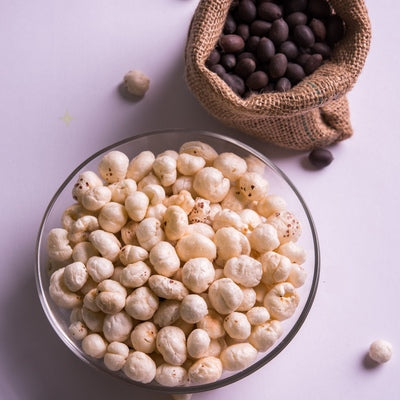
A Popped Lotus Seed Snack
Popped Lotus Seeds are the seeds of Euryale Ferox, a water lily plant that grows in Mithila region of India.
Recommended by the ancient Indian holistic healing science of Ayurveda, Makhana are eaten by yogis, for centuries in India. This delicious roasted plant-based superfood has a light and crunchy puff texture somewhat similar to pop corn.
With no cholesterol and a low glycemic index, Makhana helps the heart, strengthens the bones and is also a great source of nourishment to promote weight loss in the body.

How Makhana is made?
It takes a good amount of effort for converting the hard seeds of lotus to crunchy, light and delicious makhana snack.
- First seeds are collected from the lotus plant
- The seeds are dried and are popped at high temperatures to convert it into beautiful ball shaped makhana
- Makhana are then sorted, cleaned and graded
- Makhana are then slow roasted for extra crunch and mixed with olive oil, yogic herbs and spices
- Vola! Your delicious FoodYoga Makhana snack is ready
Why eat Makhana?
- Sustainable
- Vegan
- Gluten Free
 Protein Rich
Protein Rich
 Non GMO
Non GMO
- Roasted
Makhana (also known as lotus seed, fox nut, and phool makhana) is a popped lotus seed snack, which is crunchy and puffy.
It is a non-cereal, gluten-free snack that is rich in antioxidants, including flavonoids, polyphenols, and alkaloids. It naturally contains magnesium, potassium, calcium, iron, zinc, and vitamin B12.
It has been eaten by yogis for centuries in India because of its rich nutritional value. Packed with antioxidants and topped with yogic herbs, this makesake Sattviko's Makhana snack great for your yoga nutrition.
To make it more awesome we have made added additional nutrition benefit by altering the herbs.
- Antioxidant Makhana (with golden turmeric)
- Omega3 Makhana (with flax & chia seeds)
- Ashwagandha Makhana (with brahmi)
They all taste delicious
And if you don't believe us you can read what Yogis has to say about Makhana unique features-
- They are low in calories and high in protein
- They are gluten-free and vegan
- They are rich in antioxidants and minerals such as magnesium and potassium
- They are good for the heart as they help regulate blood pressure and reduce the risk of heart disease
- They are good for digestion as they are high in fiber.
Makhana Snack
FAQ's
Phool makhanas are made up of what?
Phool makhanas, also known as fox nuts or lotus seeds, are made from the seeds of the lotus flower.
How is makhana made from lotus seeds?
Makhana is made by harvesting lotus seeds, drying them, and then roasting them until they pop and become crunchy.
What are the side effects of makhanas?
Makhanas are generally safe to eat, but eating them in very large amounts might cause digestive issues like bloating or constipation.
What is the best time to eat makhanas?
You can eat makhanas anytime as a healthy snack. They are especially good to eat in the evening or between meals when you feel hungry.
Can diabetic patients have makhanas?
Yes, diabetic patients can eat plain or unsweetened makhanas. They have a low glycemic index, which means they help keep blood sugar levels stable. Avoid caramel flavor makhanas and go for plain ones if you have diabetes.
How much protein is in 100 gm makhana?
A 100-gram serving of makhana has around 9.7 grams of protein with 14.4 grams of fiber.
What is the shelf life of makhana?
To ensure the best quality, store makhana in an airtight container in a cool, dry place, away from direct sunlight and moisture. This will help maintain its freshness and extend its shelf life up to 365 days when unopened.






